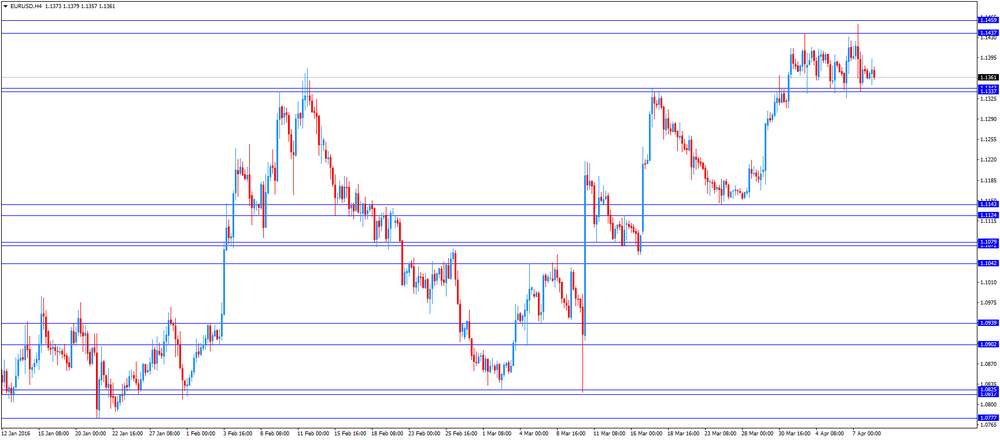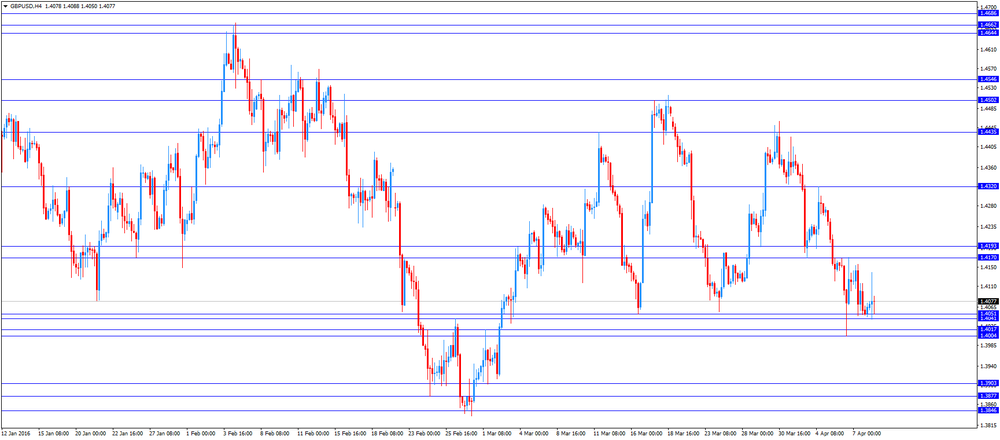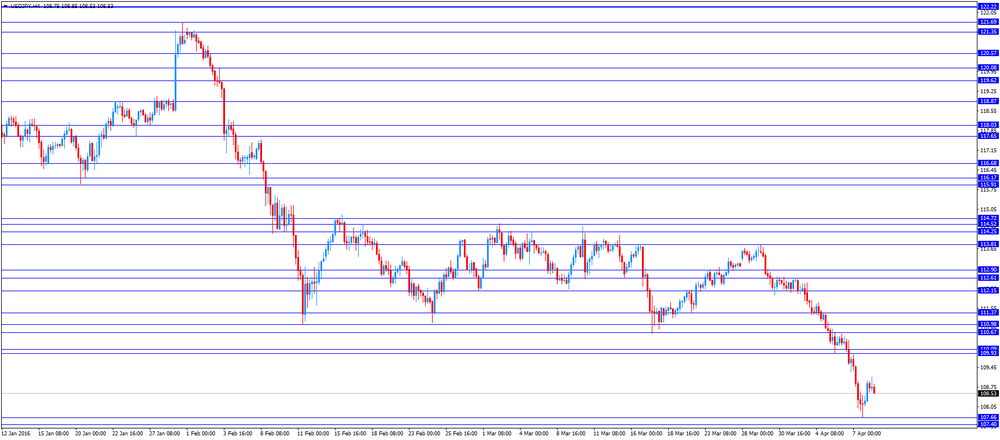- Analytics
- News and Tools
- Market News
- Foreign exchange market. European session: the British pound traded mixed against the U.S. dollar after the release of the weaker-than-expected industrial production data from the U.K.
Foreign exchange market. European session: the British pound traded mixed against the U.S. dollar after the release of the weaker-than-expected industrial production data from the U.K.
Economic calendar (GMT0):
(Time/ Region/ Event/ Period/ Previous/ Forecast/ Actual)
05:00 Japan Consumer Confidence March 40.1 40.5 41.7
05:45 Switzerland Unemployment Rate (non s.a.) March 3.7% 3.6% 3.6%
06:00 Germany Current Account February 14.3 Revised From 13.2 20.0
06:00 Germany Trade Balance (non s.a.), bln February 13.4 Revised From 13.6 20.3
06:00 Japan Eco Watchers Survey: Current March 44.6 46.5 45.4
06:00 Japan Eco Watchers Survey: Outlook March 48.2 46.7
06:45 France Industrial Production, m/m February 1.0% Revised From 1.3% -0.4% -1.0%
06:45 France Industrial Production, y/y February 1.9% 0.6%
07:15 Switzerland Consumer Price Index (MoM) March 0.2% 0.3% 0.3%
07:15 Switzerland Consumer Price Index (YoY) March -0.8% -0.9% -0.9%
08:30 United Kingdom Total Trade Balance February -5.23 Revised From -3.46 -4.84
08:30 United Kingdom Industrial Production (MoM) February 0.2% Revised From 0.3% 0.1% -0.3%
08:30 United Kingdom Industrial Production (YoY) February 0.1% Revised From 0.2% 0% -0.5%
08:30 United Kingdom Manufacturing Production (MoM) February 0.5% Revised From 0.7% -0.2% -1.1%
08:30 United Kingdom Manufacturing Production (YoY) February -0.3% Revised From -0.1% -0.7% -1.8%
The U.S. dollar traded mixed against the most major currencies ahead of the release of the U.S. wholesale sales data. Wholesale inventories in the U.S. are expected to decline 0.1% in February, after a 0.2% increase in January.
The greenback was supported by yesterday's comments by the Fed Chairwoman Janet Yellen. She said in a speech in New York that the U.S. economy continued to progress and the U.S. labour market continued to strengthen. Yellen pointed out that the Fed remained on track for further interest rate hikes, saying that the decision to raise the interest rate in December was the right decision.
The euro traded mixed against the U.S. dollar after the release of the positive trade data from Germany. Destatis released its trade data for Germany on Friday. Germany's trade surplus increased to a seasonally adjusted €19.7 billion in February from 18.7 in January.
Exports climbed 1.3% in February, while imports were up 0.4%.
On a yearly basis, German exports increased 4.1% in February, while imports rose by 4.0%.
Germany's current account surplus was €20.0 billion in February, up from €14.3 billion in January. January's figure was revised up from a surplus of €13.2 billion.
The British pound traded mixed against the U.S. dollar after the release of the weaker-than-expected industrial production data from the U.K. The Office for National Statistics (ONS) released its manufacturing and industrial production figures for the U.K. on Friday. Industrial production in the U.K. fell 0.3% in February, missing forecasts of a 0.1% increase, after a 0.2% rise in January.
The decrease was mainly driven by a decline in the manufacturing output.
On a yearly basis, industrial production in the U.K. decreased 0.5% in February, missing expectations for a flat reading, after a 0.1% increase in January. It was the largest decline since August 2013.
The decline was driven by a drop in the manufacture of machinery & equipment, which slid 10.6% year-on-year in February.
Manufacturing production in the U.K. dropped 1.1% in February, missing expectations for a 0.2% fall, after a 0.5% gain in January.
The decline was driven by a fall in in the manufacture of transport equipment, which decreased 2.9% in February.
Manufacturing output was mainly driven by a rise in other manufacturing and repair, which climbed by 4.8% in January.
On a yearly basis, manufacturing production in the U.K. decreased 1.8% in February, missing forecast of a 0.7% fall, after a 0.3% drop in January. It was the largest decrease since July 2013.
According to another report from the ONS, the U.K. trade deficit in goods narrowed to £11.96 billion in February from £12.16 billion in January. January's figure was revised down from a deficit of £10.29 billion. The decline in deficit was driven by a rise in exports.
The total trade deficit, including services, narrowed to £4.84 billion in February from £5.23 billion in January. January's figure was revised down from a deficit of £3.46 billion.
The Canadian dollar traded higher against the U.S. dollar ahead of the release of the Canadian labour market data. The unemployment rate in Canada is expected to remain unchanged at 7.3% in March.
Canada's economy is expected to add 10,000 jobs in March.
Housing starts in Canada are expected to decline to 190,000 in March from 212,600 in February.
The Swiss franc traded mixed against the U.S. dollar. The Swiss Federal Statistics Office released its consumer inflation data on Friday. Switzerland's consumer price index rose 0.3% in March, in line with expectations, after a 0.2% increase in February.
The increase was mainly driven by higher prices for petroleum products and airfares.
On a yearly basis, Switzerland's consumer price index decreased to -0.9% in March from -0.8% in February, in line with forecasts.
The Swiss State Secretariat for Economic Affairs released its unemployment data for Switzerland on Friday. The Swiss unemployment rate increased to a seasonally adjusted 3.5% in March from 3.4% in February.
EUR/USD: the currency pair traded mixed
GBP/USD: the currency pair traded mixed
USD/JPY: the currency pair fell to Y108.53
The most important news that are expected (GMT0):
12:15 Canada Housing Starts March 212.6 190
12:30 Canada Employment March -2.3 10
12:30 Canada Unemployment rate March 7.3% 7.3%
12:30 U.S. FOMC Member Dudley Speak
14:00 United Kingdom NIESR GDP Estimate March 0.3%
14:00 U.S. Wholesale Inventories February 0.2% -0.1%
© 2000-2026. All rights reserved.
This site is managed by Teletrade D.J. LLC 2351 LLC 2022 (Euro House, Richmond Hill Road, Kingstown, VC0100, St. Vincent and the Grenadines).
The information on this website is for informational purposes only and does not constitute any investment advice.
The company does not serve or provide services to customers who are residents of the US, Canada, Iran, The Democratic People's Republic of Korea, Yemen and FATF blacklisted countries.
Making transactions on financial markets with marginal financial instruments opens up wide possibilities and allows investors who are willing to take risks to earn high profits, carrying a potentially high risk of losses at the same time. Therefore you should responsibly approach the issue of choosing the appropriate investment strategy, taking the available resources into account, before starting trading.
Use of the information: full or partial use of materials from this website must always be referenced to TeleTrade as the source of information. Use of the materials on the Internet must be accompanied by a hyperlink to teletrade.org. Automatic import of materials and information from this website is prohibited.
Please contact our PR department if you have any questions or need assistance at pr@teletrade.global.


















